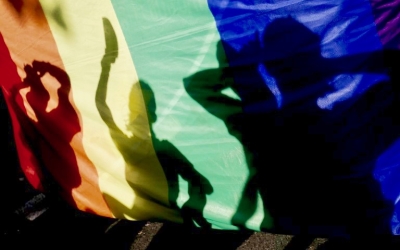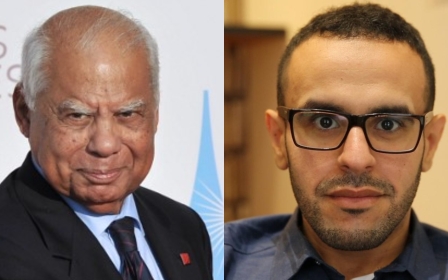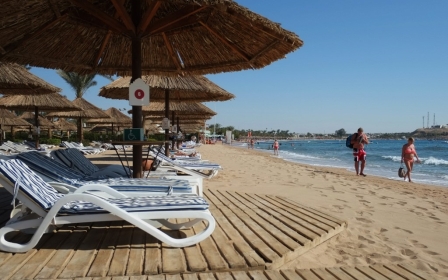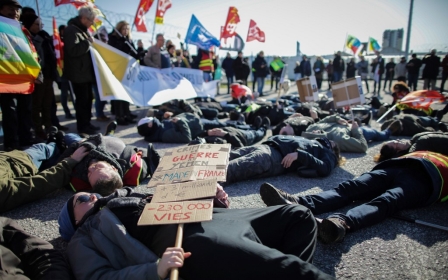‘Egypt failed her’: LGBT activist kills herself in Canada after suffering post-prison trauma
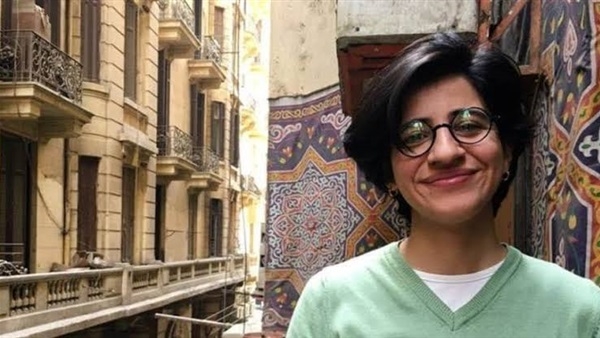
Three years after her arrest and torture by Egyptian security forces, Egyptian LGBT rights activist Sarah Hegazi has killed herself in exile in Canada, prompting a flood of sympathy and anger on social media.

On Sunday, dozens of Egyptian human rights advocates shared what seemed like a suicide note written by Hegazi.
New MEE newsletter: Jerusalem Dispatch
Sign up to get the latest insights and analysis on Israel-Palestine, alongside Turkey Unpacked and other MEE newsletters
"To my siblings, I have tried to find salvation and I failed, forgive me. To my friends, the journey was cruel and I am too weak to resist, forgive me. To the world, you were cruel to a great extent, but I forgive," a note purportedly written by Hegazi read.
Hegazi, 30, was an openly gay woman and LGBT rights advocate who, among many others, was arrested in 2017 after raising a rainbow flag at a concert of the Lebanese indie band Mashrou Leila in Cairo.
The concert was followed by one of the country’s most relentless crackdowns on the LGBT community in years.
“Egypt has failed Sarah and all the LGBT community,” Rasha Younes, a researcher at the Lesbian, Gay, Bisexual and Transgender Rights Programme at Human Rights Watch, said.
“They alienated her; they forced her out of her country; they are responsible for her suffering,” she told Middle East Eye.
According to Younes, the LGBT climate in Egypt has worsened under the government of President Abdel Fattah el-Sisi.
In 2019 alone, a local rights group documented 92 arrests of LGBT individuals, most of whom were randomly detained from the street, “indicating that the Egyptian government is profiling people based on their perceived sexual orientation and based purely on their gender expression”, Younes said.
'They alienated her; they forced her out of her country; they are responsible for her suffering'
-Rasha Younes, HRW
In an article published in 2018, Hegazi revealed she had been electrocuted and subjected to psychological torture during her three months in jail.
She said she had been diagnosed with post-traumatic stress disorder (PTSD) after her release, a condition that may have prompted her suicide.
“I suffered from severe depression, PTSD, tension, anxiety and panic attacks, with electroconvulsive therapy (ECT) that led to memory problems, before I was forced to travel for fear of arrest again,” she wrote in the article for Mada Masr in September 2018.
“In exile, I lost my mom, then I had another ECT treatment in Toronto, two suicide attempts, stuttering, panic, fear, and attempts to avoid talking about imprisonment, the inability to walk out of the room, along with a greater deterioration in memory.”
Prostitution law
Egypt does not explicitly prohibit homosexuality, but it uses the 1961 prostitution law to prosecute LGBT individuals.
Those convicted of homosexual conduct, according to the law, can be punished by up to three years in jail.
In September 2017, a media regulatory body banned the appearance of LGBT people in Egyptian media, describing homosexuality as “a disease and a shame that should be hidden until it is treated, not promoted”.
In March, the Egyptian government rejected recommendations made by several states to end discrimination against individuals based on their sexual orientation during its third Universal Periodic Review (UPR), a process that involves a review of the human rights records of United Nations member states.
“This was in front of the entire world's eyes. They need to be held to account,” Younes told MEE.
Hegazi's death has been met with mixed reactions on social media, with human rights activists mourning her death as a reflection of the Egyptian government's repression of the LGBT community, and others blaming her for her predicament.
"Sarah Hegazi has left us because our world is cruel and unmerciful," former Egyptian political prisoner Aya Hijazy wrote on Twitter.
"She was the most genuine person you could ever meet. She has never accepted the idea that she will marry a man. She suffered a lot," she added.
"To mitigate stigma among people like her, she spoke out about herself and her pain, and her constant suicidal thoughts. She wanted to help others to feel that they are not alone."
Former Egyptian Vice President Mohamed el-Baradei weighed in on the Twitter debate, saying some of the reactions to Hegazi's death reflect deeper societal issues around acceptance of the other.
"You may differ with Sarah Hegazi's thought and lifestyle, and that's your right. But is it your right to oppress her and strip her of her right to life simply because of your disagreement with her?" he wrote.
"One day, we will have enough self-confidence to learn how to accept those who are different. One day we will know the meaning of tolerance."
Middle East Eye delivers independent and unrivalled coverage and analysis of the Middle East, North Africa and beyond. To learn more about republishing this content and the associated fees, please fill out this form. More about MEE can be found here.


